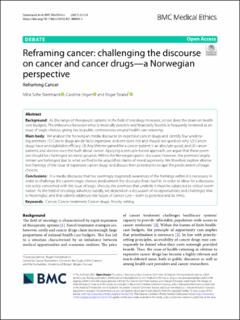| dc.contributor.author | Stenmarck, Mille Sofie | |
| dc.contributor.author | Engen, Caroline Benedicte Nitter | |
| dc.contributor.author | Strand, Roger | |
| dc.date.accessioned | 2022-01-31T13:34:09Z | |
| dc.date.available | 2022-01-31T13:34:09Z | |
| dc.date.created | 2021-10-05T14:43:52Z | |
| dc.date.issued | 2021 | |
| dc.identifier.issn | 1472-6939 | |
| dc.identifier.uri | https://hdl.handle.net/11250/2976038 | |
| dc.description.abstract | Background
As the range of therapeutic options in the field of oncology increases, so too does the strain on health care budgets. The imbalance between what is medically possible and financially feasible is frequently rendered as an issue of tragic choices, giving rise to public controversies around health care rationing.
Main body
We analyse the Norwegian media discourse on expensive cancer drugs and identify four underlying premises: (1) Cancer drugs are de facto expensive, and one does not and should not question why. (2) Cancer drugs have an indubitable efficacy. (3) Any lifetime gained for a cancer patient is an absolute good, and (4) cancer patients and doctors own the truth about cancer. Applying a principle-based approach, we argue that these premises should be challenged on moral grounds. Within the Norwegian public discourse, however, the premises largely remain unchallenged due to what we find to be unjustified claims of moral superiority. We therefore explore alternative framings of the issue of expensive cancer drugs and discuss their potential to escape the predicament of tragic choices.
Conclusions
In a media discourse that has seemingly stagnated, awareness of the framings within it is necessary in order to challenge the current tragic choices predicament the discourse finds itself in. In order to allow for a discourse not solely concerned with the issue of tragic choices, the premises that underlie it must be subjected to critical examination. As the field of oncology advances rapidly, we depend on a discussion of its opportunities and challenges that is meaningful, and that soberly addresses the future of cancer care—both its potential and its limits. | en_US |
| dc.language.iso | eng | en_US |
| dc.publisher | BMC | en_US |
| dc.rights | Navngivelse 4.0 Internasjonal | * |
| dc.rights.uri | http://creativecommons.org/licenses/by/4.0/deed.no | * |
| dc.title | Reframing cancer: challenging the discourse on cancer and cancer drugs—a Norwegian perspective | en_US |
| dc.type | Journal article | en_US |
| dc.type | Peer reviewed | en_US |
| dc.description.version | publishedVersion | en_US |
| dc.rights.holder | Copyright The Author(s) 2021 | en_US |
| dc.source.articlenumber | 126 | en_US |
| cristin.ispublished | true | |
| cristin.fulltext | original | |
| cristin.qualitycode | 1 | |
| dc.identifier.doi | 10.1186/s12910-021-00693-5 | |
| dc.identifier.cristin | 1943470 | |
| dc.source.journal | BMC Medical Ethics | en_US |
| dc.relation.project | Norges forskningsråd: 223250 | en_US |
| dc.identifier.citation | BMC Medical Ethics. 2021, 22, 126. | en_US |
| dc.source.volume | 22 | en_US |

